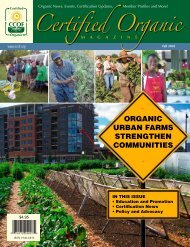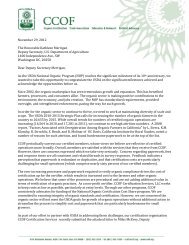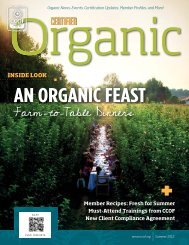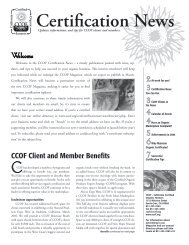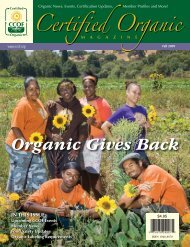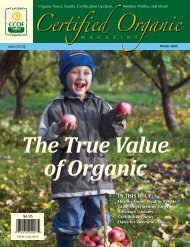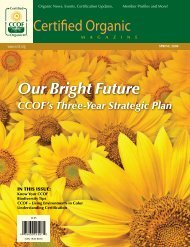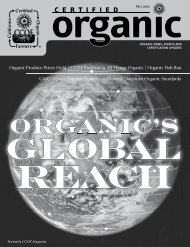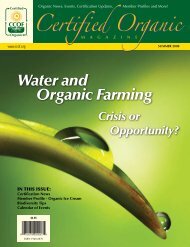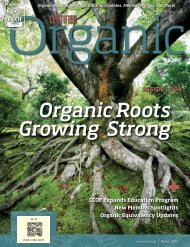Consolidation in Organic Agriculture - CCOF
Consolidation in Organic Agriculture - CCOF
Consolidation in Organic Agriculture - CCOF
Create successful ePaper yourself
Turn your PDF publications into a flip-book with our unique Google optimized e-Paper software.
a superstore <strong>in</strong> that everyth<strong>in</strong>g is available,so many vendors and customers. It is theantithesis of monoculture.”But why enter farm<strong>in</strong>g? “<strong>Organic</strong> farm<strong>in</strong>gis biologically oriented environmentalism.It is the best proactive way I know.”Jason th<strong>in</strong>ks of himself as a politicallyaware person. His motivation for grow<strong>in</strong>gorganic food is to try to make an equitableliv<strong>in</strong>g and help create an equitable economy.He says that it is his way of help<strong>in</strong>gto rebuild an economy that serves people<strong>in</strong> a better fashion. By this, he hopes tostand as an example that one can growfood <strong>in</strong> an environmental, economical,and labor susta<strong>in</strong>able way.“Most other environmental activism isretroactive—try<strong>in</strong>g to curb, halt, stop,m<strong>in</strong>imize, or clean-up environmentaldamage.” But organic farm<strong>in</strong>g is different.It helps create a cleaner world from theoutset.“That’s what organic farm<strong>in</strong>g is allabout,” says Jason.<strong>Organic</strong> Farm<strong>in</strong>g Excels <strong>in</strong> Tolerance,Climate Extremes and Counters Greenhouse GasesNew research from the Rodale Institute’s long-runn<strong>in</strong>g “Farm<strong>in</strong>g Systems Trial” providesevidence that organic cropp<strong>in</strong>g systems perform better than conventionallymanaged crops dur<strong>in</strong>g climate extremes, <strong>in</strong>dicat<strong>in</strong>g they will be a “valuableresource <strong>in</strong> an era of climate variability.” Two organic systems (one legume-based andone manure-based) out-yielded the conventional system <strong>in</strong> 4 out of 5 years of moderatedrought <strong>in</strong> southeastern Pennsylvania. Though all corn and soybean yields suffered <strong>in</strong>1999 (with 5 months of severe drought followed by the wettest September on record <strong>in</strong>the Northeast), 3 of 4 crop comparisons resulted <strong>in</strong> significantly better yields <strong>in</strong> theorganic systems compared to the conventional. Water harvest, important for groundwaterrecharge, was significantly higher over 5 years, with 16% and 25% more waterreta<strong>in</strong>ed for crop use <strong>in</strong> the organic systems.Additionally, the world’s longest runn<strong>in</strong>g study of organic farm<strong>in</strong>g (1981-2002) hasdocumented that organic soils actually clean the atmosphere of global warm<strong>in</strong>g gasesby captur<strong>in</strong>g atmospheric carbon dioxide and convert<strong>in</strong>g it <strong>in</strong>to soil material (carbonsequestration). This is the first study to differentiate organic farm<strong>in</strong>g techniques fromconventional agricultural practices for their ability to serve as carbon “s<strong>in</strong>ks.” While carbonhelps stimulate plant growth, scientists estimate carbon dioxide may be responsiblefor more than 80% of global warm<strong>in</strong>g. In the organic systems, soil carbon <strong>in</strong>creased15% to 28%.The report appeared <strong>in</strong> the American Journal of Alternative <strong>Agriculture</strong> (Vol. 18, No.3, 2003); for more <strong>in</strong>formation, contact co-author Rita Seidel, rita.seidel@rodale<strong>in</strong>st.org.A complete analysis of the report can be viewed at www.newfarm.org/depts/NFfield_trials/1103/droughtresearch.shtmlW<strong>in</strong>ter 2003–2004 Page 9




